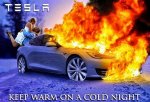- Joined
- Feb 6, 2010
- Messages
- 100,670
- Reaction score
- 53,378
- Gender
- Male
- Political Leaning
- Undisclosed
Follow the entire thread, don't just jump in with pronouncements.
I have. Your argument makes no sense. It doesn’t matter that robots build electric cars, electric cars are still a good thing to pursue.

